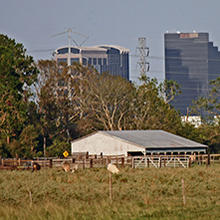Queridos todos,
La urbanización y la transformación de la agricultura, los sistemas alimentarios y los espacios rurales presentan desafíos y oportunidades para el crecimiento inclusivo, la erradicación de la pobreza, la sostenibilidad económica, ambiental y social, y la seguridad alimentaria y la nutrición. Como resultado, existe un creciente interés en los vínculos entre las zonas urbanas y las rurales y en los enfoques que puedan abordar estas cuestiones de manera holística e integrada, con el fin de abordar plenamente los retos y maximizar las oportunidades.
Esta consulta en línea le invita a contribuir a la elaboración de un documento de antecedentes (disponible en inglés) que la Secretaría del Comité de Seguridad Alimentaria Mundial (CSA) está preparando para apoyar los debates en el Foro sobre Urbanización y transformación rural y sus implicaciones para la seguridad alimentaria que tendrá lugar durante el 43º período de sesiones del CSA en octubre de 2016. Los resultados del Foro servirán de base al trabajo del próximo año, centrado en el desarrollo de una orientación sobre políticas para su aprobación en el CSA 44 en octubre de 2017.
La actual versión de trabajo del borrador inicial (disponible en inglés) se basa en aportaciones recibidas durante un taller técnico celebrado en febrero de 2016, donde se discutieron áreas clave y enfoques existentes relacionados con los vínculos urbano-rurales. Con el fin de aprovechar mejor esta consulta en línea, le invitamos a reflexionar sobre las siguientes preguntas:
- ¿Se abordan los principales desafíos y oportunidades relacionados con la seguridad alimentaria y nutricional en el contexto de la evolución de las dinámicas de las zonas urbanas y rurales? ¿Hay cuestiones que faltan, o se ha incluido alguna que no parezca estar directamente relacionada?
- ¿Resulta clara la forma en que cada una de las dinámicas exploradas afecta a la seguridad alimentaria y la nutrición? Si no es así, ¿cómo podría aclararse esto mejor?
- ¿Han sido capturados los elementos clave de los problemas de gobernanza y los enfoques integrados para abordar los vínculos urbano-rurales? Si no es así, ¿que falta?
- Donde/cómo cree que el CSA puede añadir más valor a las iniciativas actuales dirigidas a abordar la seguridad alimentaria y la nutrición en el contexto de la urbanización y la transformación rural?
Los resultados de esta consulta en línea permitirán seguir elaborando el documento de antecedentes y el diseño del Foro en el CSA 43.
Le damos las gracias por adelantado por su tiempo y por compartir sus conocimientos y experiencia con nosotros.
Deborah Fulton,
Secretaría del CSA


Comments
Many thanks,
Neil Sorensen
Dear Land Portal users,
This is your chance to ensure that land rights are taken into consideration adequately in the upcoming Food and Agriculture Organization of the Unoted Nations Committee on Food Security CFS), which will take place this October at the FAO headquarters in Rome.
In addition, it is an opportunity to share your specialized expertise on land issues and urbanization, which will provide much technical guidance to the government negotiators.
If you share your insights here, we will provide feedback directly to the Secretary of the CFS, which will be taken into account seriously.
I find "rural-rural" linkages or exchanges missing in the discussion on "territorial approaches" and/or "smart systems" in pages 17-19 of the Zero Draft. I will like to suggest the inclusion of rural-rural linkages or exchanges (or partnerships, interrelationships, cooperations) within the territorial or/and smart systems approaches.
In the context of food security, it is important to recognize that rural areas have to be primarily food secure to contribute to broader food security at regional or national levels. And as different rural areas have different concentration of agricultural or food systems, they need to partner and link with each order to attain a more balanced security and then have a stronger potential for urban-rural cooperation. Although little or no research efforts have been dedicated to rural-rural linkages, it has been in operation and only need to be further sensitized as part of the broader picture.
In another way (and from a system perspective), what I am saying is that the "rural" and "urban" as two systems and internally driven by sub-systems such as "urban-urban" and "rural-rural" first. But in the case of "rural" where the primary food sources are mostly generated, a "rural-urban" system that is not supported by a "rural-rural" system will not be sustainable to rural transformation, hence, will not have the best impact on global Food Security and Nutrition.
The entire 26-page document has no word or phrase like "tenure security" or "land tenure security". Land use planning and land tenure security can provide strong links on how the issues mentioned in the Zero Draft can connect to food security.
Tenure security is directly connected to food security. Considering that most developing countries and rural areas depend largely on land-based activities and/or natural resources for their food security attainment, it will be good to mention the need to make land tenure more secure.
Concerning land use, let's give a thought to "tenure responsive land use planning" -that is conducting land use planning in ways that lead to tenure security improvement, hence, will have a high impact on food security.